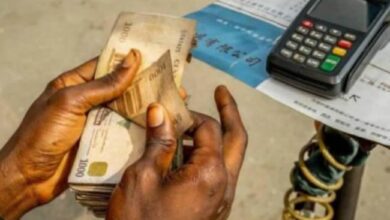AFCON 2023: Nigerians in Cote d’Ivoire want FG to fix insecurity, infrastructure
 By Muhyideen Jimoh
By Muhyideen Jimoh
The beautiful cable-stayed Cocody Bridge, also known as Alassane Ouattara Bridge, is an architectural icon not just in the bustling Ivorian commercial capital of Abidjan, but in the West Africa sub-region.
The eye-catching structure to any visitor and residents alike is the first of its kind in Côte d’Ivoire, spanning 630 metres and over 100 meters high of the popular upscale Cocody district.
Inaugurated on Aug. 12, 2023, the bridge is part of the solution to the problem of urban mobility in Cote d’Ivoire’s economic capital.
AFCON 2023: Concern as Super Eagles depart Abidjan for Bouake without Osimhen
Interestingly, all visitors and fans to the Africa Cup of Nations (AFCON) in the Abidjan centre will most certainly commute on the bridge to the Feliz Houphouet-Boigny stadium.
They will also need it for trips their respective hotels in the eye-brow Cocody area.
It was a scorching afternoon, just before one of the block buster knock out matches at the Iconic 33,000 Feliz Houphouet-Boigny Stadium in the heart of the city.
About noon on that match day, Ivorian fans draped in their national colours were trooping to the stadium amidst singing and blaring of their popular vuvuzelas.
As they gyrated this writer could hear some Nigerians just by the foot of the bridge arguing about insecurity back in their homeland.
Nigeria has not lacked fans’ support at the ongoing African Cup of Nations (AFCON). In fact, it is safe to say that the Super Eagles feel like playing away from home.
The large chunk of that fan base is Nigerians in the host country. You can call them members of Nigeria’s ever-expanding ‘japa’ family.
So, he decided to engage them, and could immediately feel their pain and frustration at the state of things back home.
Mr Felix Afolabi, a business man and CEO, Don Travels and Tour, Abidjan said he has been residing in Abidjan with his family for close to a decade, due to the enabling environment for his business.
He appealed to the Federal Government to immediately declare a state of emergency on insecurity, power and infrastructure in order to encourage Nigerians abroad return home.
“I think the major problems the present government need to tackle urgently are the issues of this naira depreciation, insecurity and infrastructure.
“Here in Cote d’Ivoire, the government has done a lot to boost infrastructure and tackle the issue of insecurity, you can see most of the streets have functional CCTV cameras for crime detection.
“These are some of the things we want back home, so that some of us can return home, we really need government to address the issue of kidnapping in Nigeria,” he said.
Chukwuebuka Eze, a Nigerian businessman who owns an electronics shop in Abidjan said the depreciation of the naira and high cost of logistics is really affecting business.
“Cote d’Ivoire is a nice and peaceful country, despite their challenges.
“At least you can see for yourself, the government here has done a lot in terms of provision of basic amenities, light is stable, the roads are good and there is security.
“Nigeria as giant of Africa need to do a lot more to make it’s citizen comfortable, we are blessed with human and natural resources, but there is still so much suffering back home.
“Our government need to do more to address our challenges such as insecurity and the power problem,” he said.
‘Japa’, a Yoruba word for ‘leave’ is one of the most used words in Nigeria at that moment as Nigerians seek greener pasture abroad. There priority destinations include Canada, UK, U.S., Germany and other European countries.
In Africa, the preferred destinations are South Africa, Cote D’Ivoire, Ghana and some North Africa. Nigerians are among the most travelled communities in the world.
Already Nigeria is losing some of its best brains in medicine, nursing, academics to the `japa` syndrome.
There have been calls for the Federal Government to take actions to stop ‘japa’. A motion to stop the migration has been rejected by the House of Representatives, the lower chamber of the Federal Government bicameral legislature.
In his motion for halting the migration, Hon. Philip Agbese (APC-Benue) said statistics from the Nigerian Economic Summit indicated a mass relocation young Nigerians abroad.
“The recent reports by African Polling Institute indicate that 69% of young people would opt to relocate abroad if given the chance or if the opportunity presents itself.
“There is a 40% increase in the number of young Nigerians leaving the nation.
“This is compared to the number captured in 2019, as the United Nations Department of Economic and Social Affairs reported that international emigration from Nigeria in 2020 total 1.7million, which is a substantial increase from 990,000 in 2010“, he said.
But when put to voice vote by Speaker Tajudeen Abbas, majority of the lawmakers voted against the motion.
“Some has said Nigerian youths who want to leave the country for developed nations cannot be restrained by the government.
“Youths can’t be restrained. It’s like a two-edged sword. Travelling overseas is about more exposure. We need more exposed people and when they get their exposure, they can come back.
“I believe we need people to leave, to get more experience.“Maybe when they come back. They will be the people that will be in the government and they will be able to replicate what they have seen over there“, a national daily quoted the Paramount Ruler of Iwoland, Oba Abdulrosheed Akanbi as saying.
Whatever the gains of ‘japa’, many Nigerians argue that it is draining the country of its best brains. To minimize it, they urge the provision of the enabling environment for professionals in various sectors to excel.
They also advocate improvements in the welfare package of professionals and other Nigerians.
It is important that for those who want to migrate, government should provide them with a safe exit, devoid of extortion, exploitation and torture.
President, Nigerian community in Cote d’Ivoire, Chief Michael Emeka Onwuchelu, on his part says there is need for the federal government to address the issue of human trafficking and illegal migration.
Analyst say to contain ‘japa` the Nigeria’s government must address the high level of poverty, poor economic conditions and high rate of unemployment among others in Africa’s largest economy.
To halt the trend which has turned Nigeria to a training ground for human resources for richer nations, the federal government Prof. Chris Ogbechie says the government should develop well-articulated policies.
He said such policies should address the root causes of the syndrome, while mitigating the challenges associated with it.
Her spoke at the advice at the 16th Anthony Cardinal Okogie Foundation Lecture, in Lagos
“Such policies should also encourage them to return home and help with our development,” said Ogbechie who is a Professor of Strategic Management and the Dean at Lagos Business School, Pan-Atlantic University.
News Agency of Nigeria











